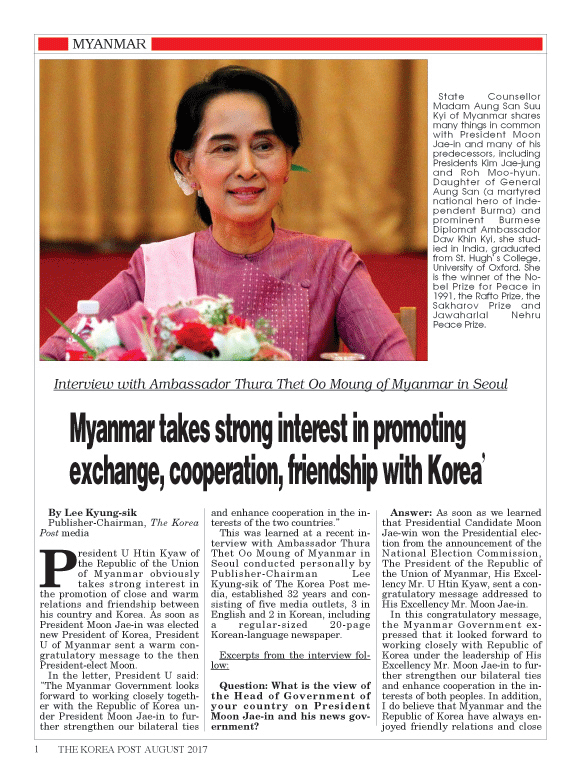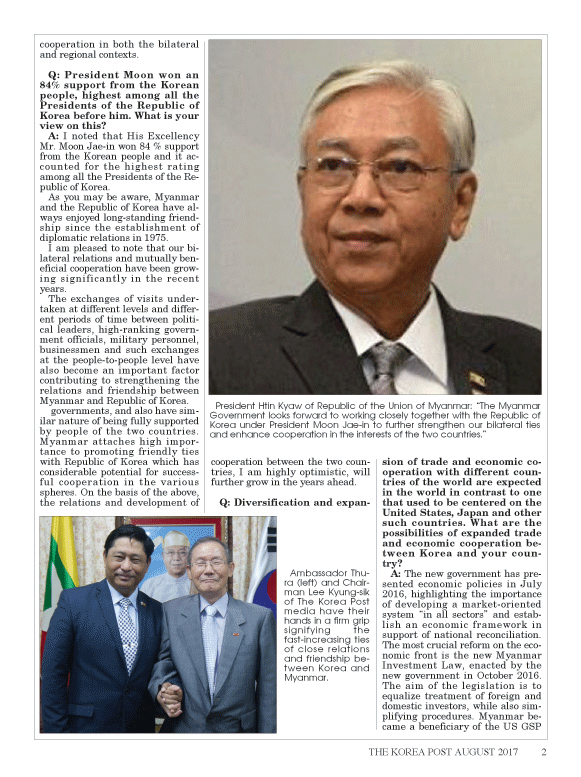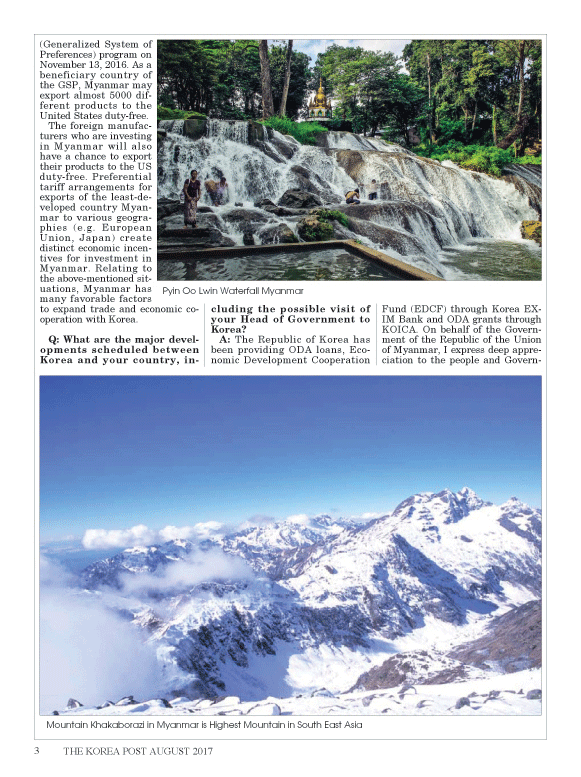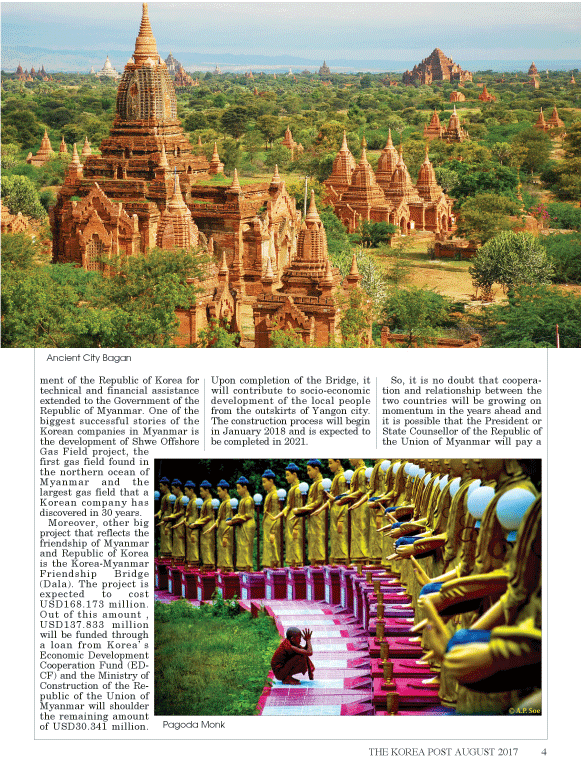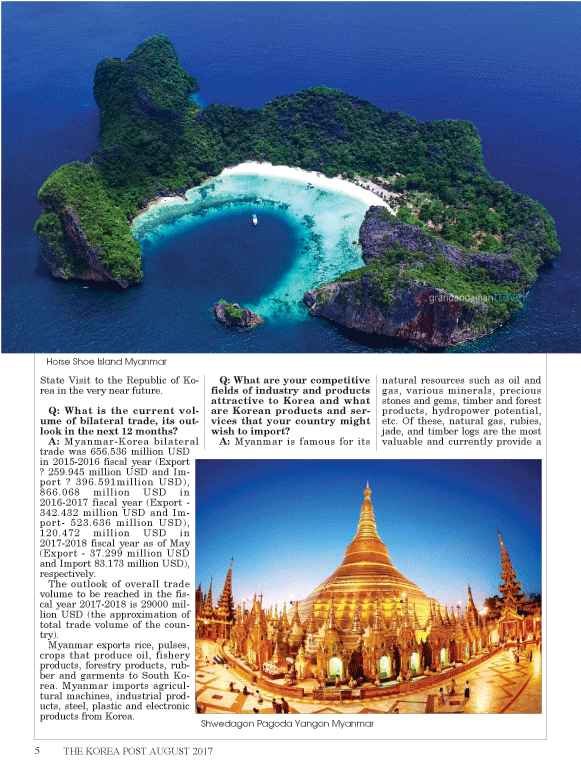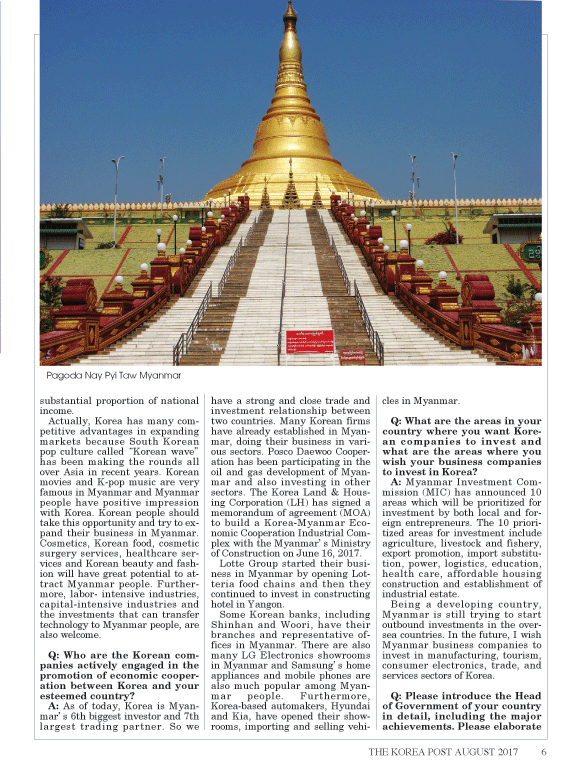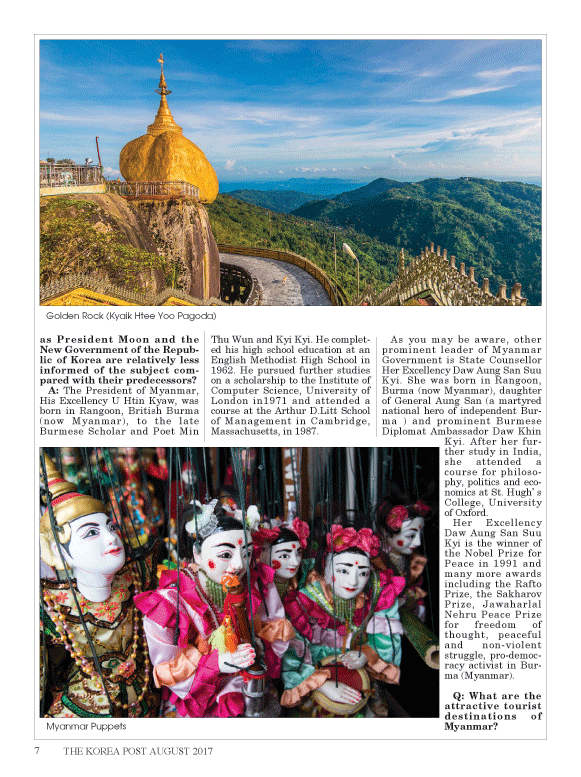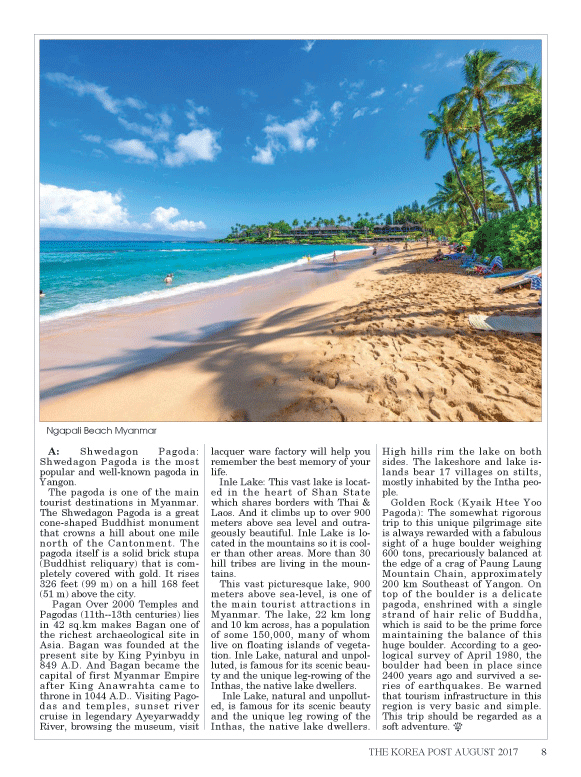Her life dedicated to the freedom and independence of Myanmar
In the mind of many people in Korea, the profile of State Counsellor Aung San Suu Kyi of the Republic of Union of Myanmar is a combination of Korean independence fighters Kim Koo and former Presidents Kim Dae-jung and Roh Moo-hyun as well as incumbent President Moon Jae-in.
The incumbent government of the Republic of Korea led by President Moon Jae-in has a good prospect of substantially increased economic cooperation with Myanmar as well as in the political, social and cultural areas.
With Madam Aung San Suu Kyi in place as well as President Htin Kyaw in Myanmar and the Republic of Korea led by President Moon sharing many things in common with Suu Kyi, Korea and Myanmar obviously have an extremely bright outlook of increased cooperation between the two countries.
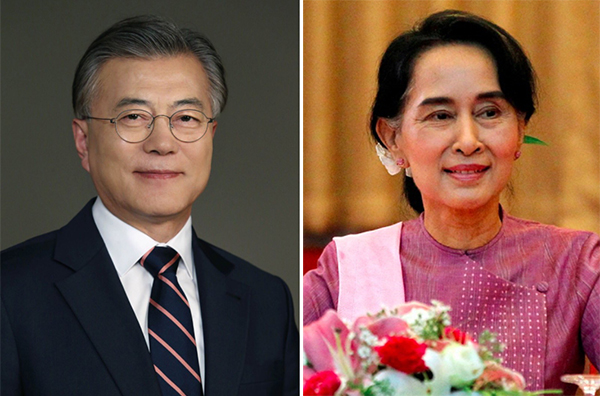
President Moon and Supreme Counselor Suu Kyi share a common background of hailing from the opposition camp and both championed for the promotion of civil rights of the common people, especially for the poor. Moon did it as a ‘poor people’s lawyer’ and Aung San Suu Kyi as an independence fighter.
Both Moon and Aung San Suu Kyi had repeated imprisonment for their championing activities for the protection of the rights of the people, the poor people—although, perhaps, the lady leader of Myanmar suffered longer years than Moon under detention. This is because Aung San Suu Kyi started political activities much earlier and longer than Moon.
The most conspicuous common area shared by Moon and Aung San Suu Kyi is the inveterate passion they have to fight for the poor and justice. At this time, it might not be amiss for the readers in Korea to learn the background of Aung Sang Suu Kyi:
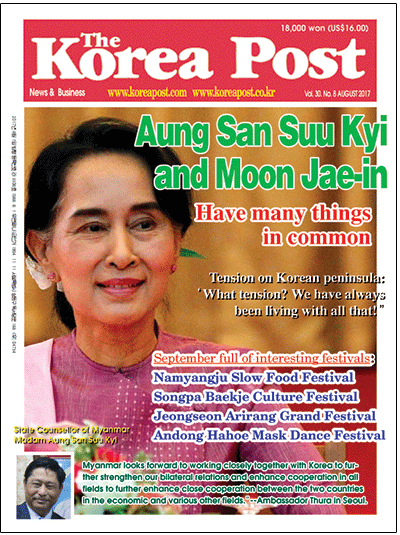
Here is a brief resume of State Councilor Aung San Suu Kyi:
Aung San Suu Kyi is the first State Counsellor and leader of the National League for Democracy. She is also the first lady minister to serve as the Minister of Foreign Affairs of Myanmar, the Minister of the President's Office, the Minister of Electric Power and Energy, and the Minister of Education in the President Htin Kyaw Cabinet.
The youngest daughter of the famed Aung San, the Father of the Nation of modern-day Myanmar, and Khin Kyi, Aung San Suu Kyi was born in Rangoon, British Burma.
After graduating from the University of Delhi in 1964 and the University of Oxford in 1968, she worked at the United Nations for three years.
Aung San Suu Kyi rose to prominence in the 1988 Uprisings, and became the GeneralSecretary of the National League for Democracy (NLD), which she had newly formed with the help of several retired army officials who criticized the military junta. In the 1990 elections, NLD won 81% of the seats in the Parliament, but the results were nullified, as the military refused to hand over power, resulting in an international outcry. She had, however, already been detained under house arrest before the elections. She remained under house arrest for almost 15 of the 21 years from 1989 to 2010, becoming one of the world's most prominent political prisoners.
Her party boycotted the 2010 elections, resulting in a decisive victory for the military-backed Union Solidarity and Development Party.
Aung San Suu Kyi became a Pyithu Hluttaw MP while her party won 43 of the 45 vacant seats in the 2012 by-elections. In the 2015 elections, her party won a landslide victory, taking 86% of the seats in the Assembly of the Union--well more than the 67 percent supermajority needed to ensure that its preferred candidates were elected President and Second Vice President in the Presidential Electoral College. Although she was prohibited from becoming the President due to a clause in the constitution--her late husband and children are foreign citizens--she assumed the newly created role of State Counsellor, a role akin to a Prime Minister or a head of government.
Aung San Suu Kyi's honors include the Nobel Peace Prize, which she won in 1991.
Aung San Suu Kyi, like other Burmese names, includes no family name, but is only a personal name, in her case derived from three relatives: "Aung San" from her father, "Suu" from her paternal grandmother, and "Kyi" from her mother Khin Kyi. The people in Maynmar refer to her as Daw Aung San Suu Kyi. Daw, literally meaning "aunt", is not part of her name but is a Burmese honorific for any older and revered woman, akin to "Madame" The people in Myanmar sometimes address her as Daw Suu or Amay Suu ("Mother Suu Aung San Suu Kyi was born on June 19, 1945 in Yangon. She reportedly was born in a small village outside Yangon called Hmway Saung. Her father, Aung San, founded the modern Burmese army and negotiated Burma's independence from the British Empire in 1947; he was assassinated by his rivals in the same year.
She grew up with her mother, Khin Kyi, and two brothers, Aung San Lin and Aung San Oo, in Yangon. Aung San Lin died at the age of eight, when he drowned in an ornamental lake on the grounds of the house. Her elder brother emigrated to San Diego, California, becoming a United States citizen. After Aung San Lin's death, the family moved to a house by Inya Lake where Aung San Suu Kyi met people of various backgrounds, political views and religions.
She was educated in Methodist English High School (now Basic Education High School No. 1 Dagon) for much of her childhood in Burma, where she was noted as having a talent for learning languages. She speaks four languages: Burmese, English, French and Japanese. She is a Theravada Buddhist.
Suu Kyi's mother, Madam Khin Kyi, gained prominence as a political figure in the newly formed Burmese government. She was appointed Burmese ambassador to India and Nepal in 1960, and Aung San Suu Kyi followed her there. She studied in the Convent of Jesus and Mary School in New Delhi, and graduated from Lady Shri Ram College, a constituent college of the University of Delhi in New Delhi, with a degree in politics in 1964.
Suu Kyi continued her education at St Hugh's College, Oxford, obtaining a B.A degree in Philosophy, Politics and Economics in 1967, graduating with a third and M.A. degree in politics in 1968.
After graduating, she lived in New York City with family friend Ma Than E, who was once a popular Burmese pop singer. She worked at the United Nations for three years, primarily on budget matters, writing daily to her future husband, Dr. Michael Aris. On Jan. 1, 1972, Aung San Suu Kyi and Aris, a scholar of Tibetan culture, living abroad in Bhutan, were married.
The following year she gave birth to their first son, Alexander Aris, in London; their second son, Kim, was born in 1977. Between 1985 and 1987, Suu Kyi was working toward an M.Phil degree in Burmese literature as a research student at SOAS, the School of Oriental and African Studies, University of London. She was elected as an Honorary Fellow of SOAS in 1990. For two years, she was a Fellow at the Indian Institute of Advanced Studies in Shimla, India. She also worked for the government of the Union of Burma.
In 1988, Suu Kyi returned to Burma, at first to tend for her ailing mother but later to lead the pro-democracy movement. Aris' visit in Christmas 1995 turned out to be the last time that he and Suu Kyi met, as Suu Kyi remained in Burma and the Burmese dictatorship denied him any further entry visas. Aris was diagnosed with prostate cancer in 1997 which was later found to be terminal.
